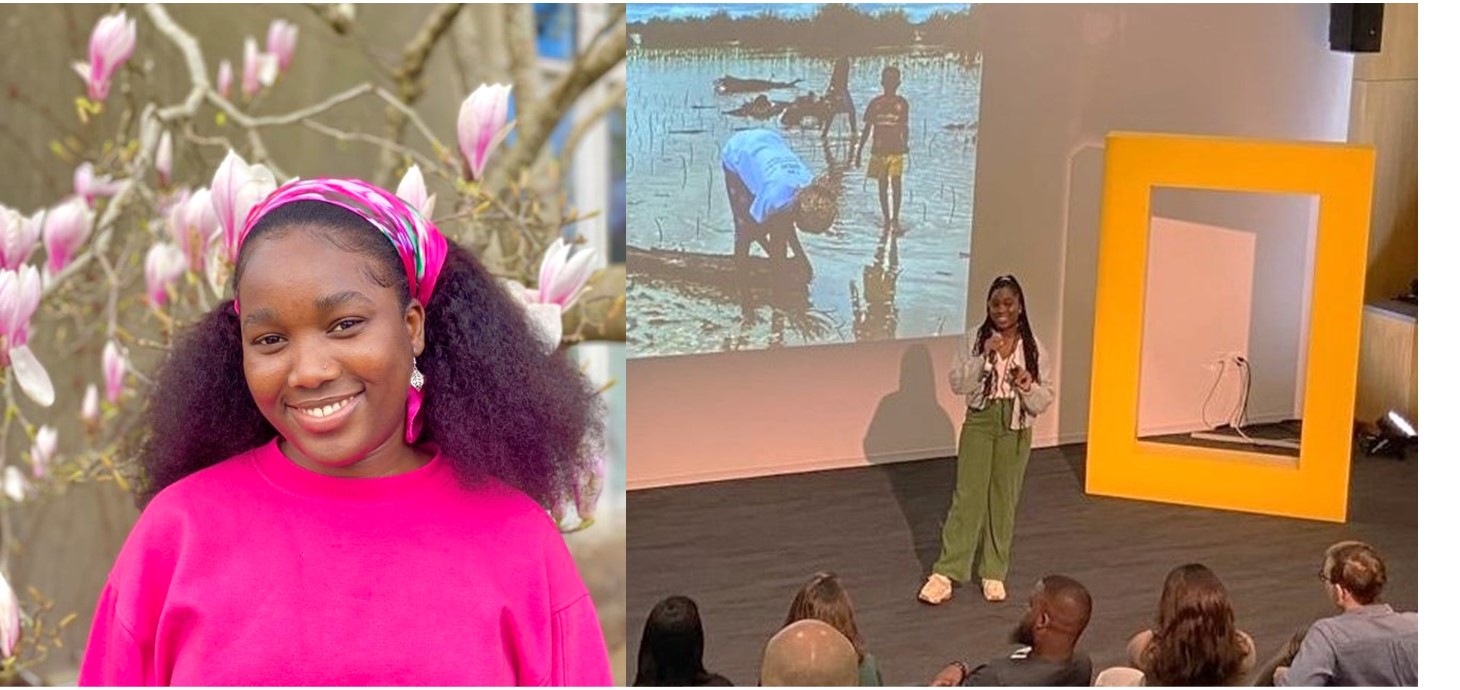
Betty Jahateh (l) and Betty (r) presenting her research on salt in rivers in The Gambia at National Geographic headquarters in Washington DC
A Swansea student in environmental biology has been selected by National Geographic to join their list of Young Explorers – exceptional individuals in their fields - and has just presented her research at the organisation’s headquarters in Washington DC.
Betty Jahateh from The Gambia is studying an MSc in Environmental Biology: Conservation & Resource Management in the Department of Biosciences at Swansea University.
An expert in marine and freshwater sciences, she has educated more than 1,500 students about the subject. She has also coordinated environmental monitoring projects with citizen scientists, led a project on saltwater intrusion, and trained students on mangrove ecology and restoration.
Last year Betty attended COP27 to share her perspective on climate challenges in west Africa. She has been working tirelessly to understand climate change impacts and promote environmental education in the coastal communities of The Gambia.
The National Geographic Society, set up in 1888, funds “the best and brightest individuals dedicated to scientific discovery and understanding of our world.” National Geographic Young Explorers are selected for their exceptional courage, leadership, and impact-driven solutions.
Betty recently attended the National Geographic Young Explorer meeting in their Washington DC headquarters. She talked about her project "Salty Much?", funded by National Geographic, which studies salt intrusion effects along the tributaries of the River Gambia.
Betty Jahateh, describing her US visit to present her research at National Geographic, said:
"It was an absolutely fantastic experience that allowed me to witness first hand the remarkable support and warmth within the entire National Geographic community. I would go so far as to liken it to a family, where everyone genuinely cheers you on and is eager to see you succeed, readily offering their resources.
Moreover, I was deeply impressed by the incredible qualities of my fellow young explorers; it became evident that each of us truly deserved to be part of this exceptional community.
The passion, commitment, and dedication we all exhibit towards our planet's well-being is nothing short of amazing. We not only supported one another wholeheartedly during the spotlight practice but also collaborated in making our projects better.
Dr Aisling Devine of Swansea University biosciences department, Programme Director (MSc Environmental Biology: Conservation and Resource management), said:
“It is fantastic news that Betty has been selected for the National Geographic explorer award. Betty has been enthusiastic and dedicated to environmental biology issues right from the start, and it is great to see that hard work has paid off with winning this award.
There is no doubt that Betty will become an environmental science leader for the future.”
Biosciences at Swansea University offers undergraduate courses in biology, zoology and marine biology. These courses are all accredited by the Royal Society of Biology. They also offer taught Masters courses, such as the one in environmental biology that Betty is currently following.
The department collaborates with local, national and international organisations to work on projects that help to improve life below water and life on land.
In the most recent Research Excellence Framework (REF), 96.4% of the department's research was judged to be world-leading or internationally excellent.
Swansea is a fantastic location to study biosciences. Diverse habitats are located on the nearby Gower Peninsula (a Site of Special Scientific Interest, and the UK’s first Area of Outstanding Natural Beauty), in the Swansea Valley and further afield in the Brecon Beacons National Park and Pembrokeshire.
The department also has a new £1.3 million purpose-built catamaran research vessel which allows students and researchers to carry out activities in Swansea Bay and further afield.
